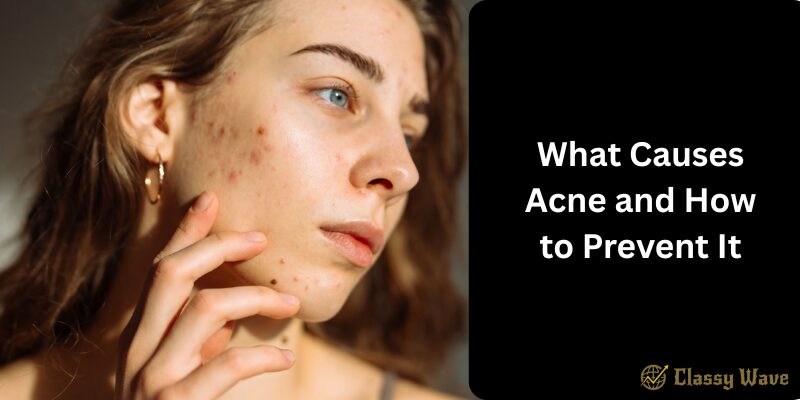What Causes Acne and How to Prevent It | Classy Wave
Acne — that annoying and often confidence-breaking skin problem — is something almost everyone experiences at some point. But have you ever wondered what really causes acne and how you can prevent it? Don’t worry, you’re not alone! In this article, we’ll explore the science behind acne, what triggers it, and the best ways to keep your skin clear and healthy.
What Is Acne?
Acne is a common skin condition that occurs when your hair follicles become clogged with oil (sebum), dead skin cells, and bacteria. It usually appears on the face, back, chest, and shoulders — basically, anywhere your oil glands are most active.
The Main Causes of Acne
1. Excess Oil (Sebum) Production
Your skin naturally produces oil to stay moisturized, but too much sebum can mix with dead skin cells and block pores, leading to acne breakouts.
2. Clogged Hair Follicles
When your pores get blocked by oil and dead skin, it creates the perfect environment for bacteria to thrive. This leads to whiteheads, blackheads, and pimples.
3. Bacteria Build-Up
The bacteria called Propionibacterium acnes (P. acnes) can multiply inside clogged pores, causing inflammation and redness.
4. Hormonal Changes
Hormones play a major role in acne development. During puberty, menstruation, pregnancy, or stress, androgen hormones increase oil production, which can worsen acne.
5. Diet and Lifestyle
High-glycemic foods like sugary snacks, dairy, and processed carbs can trigger acne for some people. Unhealthy lifestyle habits like lack of sleep and poor hydration can also contribute.
6. Stress
When you’re stressed, your body releases cortisol — a hormone that can increase oil production and inflammation, making acne worse.
Different Types of Acne
Understanding what type of acne you have helps in treating it effectively.
- Whiteheads: Closed clogged pores
- Blackheads: Open clogged pores
- Papules: Small red, tender bumps
- Pustules: Pimples with pus at the tip
- Nodules: Large, painful lumps beneath the skin
- Cysts: Deep, painful, pus-filled lesions (can cause scarring)
How to Prevent Acne Naturally
1. Keep Your Face Clean
Wash your face twice a day with a gentle cleanser to remove dirt, oil, and bacteria. Avoid harsh scrubbing — it can irritate your skin.
2. Moisturize Regularly
Even oily skin needs moisture! Choose a non-comedogenic moisturizer that hydrates without clogging pores.
3. Avoid Touching Your Face
Your hands carry bacteria that can worsen acne. Avoid picking or popping pimples — it can lead to scarring.
4. Use Acne-Fighting Ingredients
Look for products with:
- Salicylic Acid: Helps unclog pores
- Benzoyl Peroxide: Kills acne-causing bacteria
- Niacinamide: Reduces inflammation and redness
- Tea Tree Oil: A natural antibacterial option
5. Maintain a Healthy Diet
Focus on foods rich in omega-3 fatty acids, antioxidants, and vitamins (like fruits, vegetables, nuts, and fish). Cut down on sugar and dairy if they seem to trigger your acne.
6. Manage Stress
Try yoga, meditation, or regular exercise to reduce stress levels. Remember — your skin often reflects your inner well-being.
7. Stay Hydrated
Drinking enough water helps flush out toxins and keeps your skin hydrated and glowing.
8. Get Enough Sleep
Poor sleep can increase inflammation and stress hormones, both of which worsen acne. Aim for 7–8 hours every night.
Medical Treatments for Acne
If natural remedies don’t work, consult a dermatologist for:
- Topical Retinoids (like tretinoin or adapalene)
- Antibiotic creams or pills to kill bacteria
- Birth control pills (for hormone-related acne in women)
- Chemical peels or laser therapy for severe cases
Common Acne Myths Debunked
- Myth: Only teenagers get acne.
Fact: Adults can suffer from acne too, especially due to hormonal changes or stress. - Myth: Sun exposure clears acne.
Fact: It might dry pimples temporarily, but it can worsen inflammation and cause hyperpigmentation. - Myth: Washing your face more often prevents acne.
Fact: Overwashing can irritate your skin and increase oil production.
When to See a Dermatologist
If your acne is painful, cystic, or leaving scars, it’s time to seek professional help. Dermatologists can identify the root cause and design a personalized treatment plan.
Conclusion
Acne may be common, but it’s definitely manageable. By understanding what causes it — from hormones and oil production to diet and stress — you can take practical steps to prevent breakouts and maintain clear, radiant skin. Be patient and consistent with your skincare routine, and remember that clear skin starts with healthy habits!



